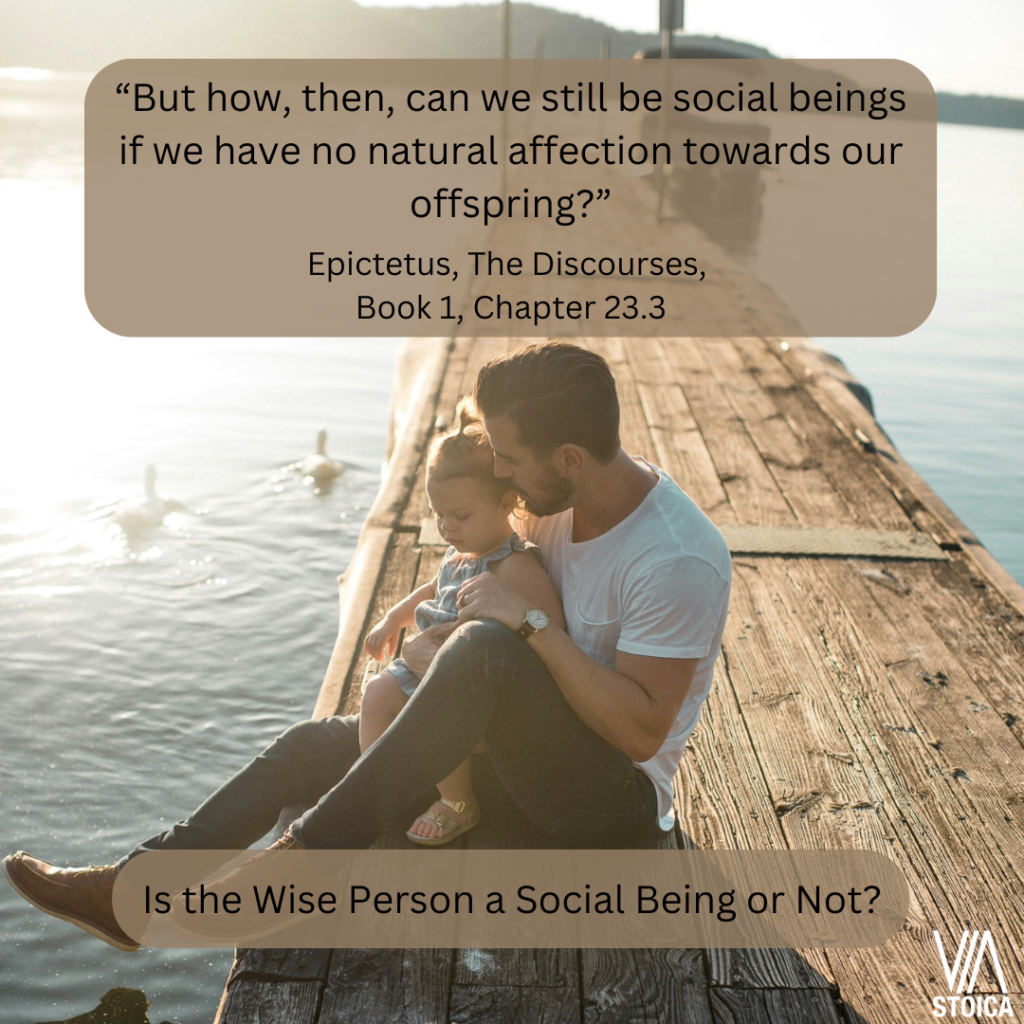The Discourses of Epictetus, Book 1.23: Against Epicurus

Is the wise person a social being? What is our obligation to society? Can we remove ourselves from our duties because they would cause us distress? According to Epicurus, that’s exactly what we should do. In this discourse, Epictetus takes on these thoughts and the entire Epicurean school. The topic of this short entry is whether or not a wise man should bring up children.
Are you not sure of your role in society? Get in touch with our Stoic coaches.
“Even Epicurus is aware that we are by nature social beings, but once he has placed our good in what is merely our shell, he cannot afterwards say anything other than that.”
Epictetus, The Discourses, Book 1, Chapter 23.1
Pleasure is the only good
Epicurus was a contemporary of Zeno and a rival philosophically speaking. While the Stoics hold that Virtue is the only good, the Epicureans focus on pleasure. With pleasure being good and pain bad. But what do they see as pleasure:
“By pleasure we mean the absence of pain in the boy and of trouble in the soul.”
Diogenes Laertius, Lives of Eminent Philosophers, Book X, Epicurus, p. 657
In this letter to Menoeceus, Epicurus explains the main concepts of his school. Seeking pleasure is the only good, but he places great importance on prudence. In his letter, he even puts that above philosophy itself. It’s not the hedonistic lifestyle we often think of when we look at Epicureanism, with its focus on pleasure. But as Epicurus states himself:
“It is sober reasoning, searching out the ground of every choice and avoidance, and banishing those beliefs through which the greatest tumults take possession of the soul.”
Diogenes Laertius, Lives of Eminent Philosophers, Book X, Epicurus, p. 657
From prudence stem all the other virtues, Epicurus believes. This relation to the virtues shows that there are similarities between Stoicism and Epicureanism. This is also why Seneca uses several quotes by Epicurus in his letters to Lucilius. But the core of the philosophies are different. How they get to the good and what this means.

Are we in our nature social beings?
Let’s have a quick look at the physics of both philosophies. The Epicureans believe that the atoms behave randomly and in solitude as they move through the void. In comparison, the Stoics believe that it is a whole and that it is all connected. One string of cause and effect links the smallest and the biggest bodies together. That’s why the Stoics would never forgo their social duties.
And although Epicurus holds friendships in high regard, the does think that the wise person abstains from getting involved in politics or marriage.
“Nor, again, will the wise man marry and rear a family.”
Diogenes Laertius, Lives of Eminent Philosophers, Book X, Epicurus, p. 645
“Nor will he take part in politics.”
Diogenes Laertius, Lives of Eminent Philosophers, Book X, Epicurus, p. 645
Not to be cut off from the good
“For, again, he (Epicurus) strenuously maintains, that we ought not to admire or accept anything that is cut off from the nature of the good.”
Epictetus, The Discourses, Book 1, Chapter 23.2
What is the good and where does it lie? Another distinction between the Stoics and the Epicureans is that the latter place the good also in the body. They connect the soul and body tightly together. In Stoicism, the body is a preferred indifference. It is not needed to live a good life. It is our goal to make sure the soul is in harmony with nature as a whole, independent of the state of our physical presence.
Read the summaries of the other Discourses here.
This connection to the whole, where the soul is part of nature, links back to our position in society. We have a certain duty to perform. To the greater good, it is to live virtuous and in accordance with nature. When we bring that to the circle that is closer to our core, that is to perform our task. Whether that is within politics or as a parent, the good life lies in how we execute these duties.
The wise Epicurean doesn’t raise children
“But how, then, can we still be social beings if we have no natural affection towards our offspring?”
Epictetus, The Discourses, Book 1, Chapter 23.3

“Why do you, Epicurus, dissuade a wise man from bringing up children? Why are you afraid that upon their account he will be caused distress?”
Epictetus, The Discourses, Book 1, Chapter 23.3
It is, in my opinion, not a requirement to have children if one seeks to live the good life. Especially when we look at our modern times, where child mortality rates have dropped considerably. The preservation of our species is not under imminent threat. There are other ways to contribute to the upbringing of the next generations. But whether or not someone is a parent, should not determine if they can have a fulfilled life.
Epicurus steers his disciples away from parenthood or politics because it can cause the wise person distress. And when we remember that the Epicureans hold pleasure before pain, they think that these social activities will cause tumult to the soul.
Out of our power Not to love our child
“But Epicurus knew that, if once a child is born, it is no longer in our power not to love and care for it.”
Epictetus, The Discourses, Book 1, Chapter 23.5
Is it this love and attachment for someone else that causes the wise person distress? Or the fact that it is no longer in our power or sphere of choice? He had the same view towards public life, the attachment would be too great and involve too many obligations. Keeping him away from pursuing the good philosophical life. But the Stoics say that this should not withhold someone from living the good life.
Marcus Aurelius, the emperor of the Roman Empire, reminds himself and us, that one can even live well in a palace. No matter what social position you hold, it is up to you to do your best. But even as a parent, the good cannot be found in having a child. It still needs to come within, by being the best possible mother or father.
Are we worse than sheep or wolves?
“Not even a sheep or wolf deserts its offspring, so shall a human being?”
Epictetus, The Discourses, Book 1, Chapter 23.7

At this point, we are beyond the question of whether or not to have children. But now Epictetus is looking at the responsibility a parent should have to their children. Even the animals, some we see as silly and others as savage, still don’t desert their offspring. We need to take care of them, especially if we see ourselves as higher and more evolved than the animals.
As social beings, we have a responsibility to the world around us. We are part of it and the manner in which we perform our duties will determine whether we live the good life. Where the Epicureans see certain parts of life as sources for distress or pain, things that should be avoided. The Stoics don’t make that distinction. Life is what happens to us and we need to use our reason and logic to act in the best and most virtuous way as the moment requires of us.
Do you struggle with the duties you have in life? Are they causing your stress and anxiety? Get in touch with our Stoic coaches and book a free consultation. There we can explore the avenues as to how we can help you.



0 Comments